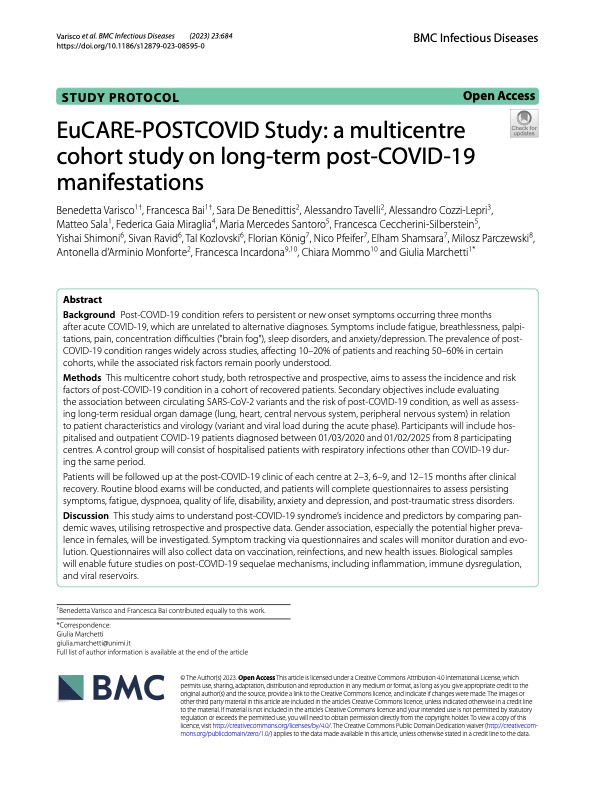Publication links
Abstract
Background
Post-COVID-19 condition refers to persistent or new onset symptoms occurring three months after acute COVID-19, which are unrelated to alternative diagnoses. Symptoms include fatigue, breathlessness, palpitations, pain, concentration difficulties (“brain fog”), sleep disorders, and anxiety/depression. The prevalence of post-COVID-19 condition ranges widely across studies, affecting 10–20% of patients and reaching 50–60% in certain cohorts, while the associated risk factors remain poorly understood.
Methods
This multicentre cohort study, both retrospective and prospective, aims to assess the incidence and risk factors of post-COVID-19 condition in a cohort of recovered patients. Secondary objectives include evaluating the association between circulating SARS-CoV-2 variants and the risk of post-COVID-19 condition, as well as assessing long-term residual organ damage (lung, heart, central nervous system, peripheral nervous system) in relation to patient characteristics and virology (variant and viral load during the acute phase). Participants will include hospitalised and outpatient COVID-19 patients diagnosed between 01/03/2020 and 01/02/2025 from 8 participating centres. A control group will consist of hospitalised patients with respiratory infections other than COVID-19 during the same period.
Patients will be followed up at the post-COVID-19 clinic of each centre at 2–3, 6–9, and 12–15 months after clinical recovery. Routine blood exams will be conducted, and patients will complete questionnaires to assess persisting symptoms, fatigue, dyspnoea, quality of life, disability, anxiety and depression, and post-traumatic stress disorders.
Discussion
This study aims to understand post-COVID-19 syndrome’s incidence and predictors by comparing pandemic waves, utilising retrospective and prospective data. Gender association, especially the potential higher prevalence in females, will be investigated. Symptom tracking via questionnaires and scales will monitor duration and evolution. Questionnaires will also collect data on vaccination, reinfections, and new health issues. Biological samples will enable future studies on post-COVID-19 sequelae mechanisms, including inflammation, immune dysregulation, and viral reservoirs.
Trial registration
This study has been registered with ClinicalTrials.gov under the identifier NCT05531773.
Keywords
Citation
EuCARE-POSTCOVID Study: a multicentre cohort study on long-term post-COVID-19 manifestations
Benedetta Varisco, Francesca Bai, Sara De Benedittis, Alessandro Tavelli, Alessandro CozziLepri, Matteo Sala, Federica Gaia Miraglia, Maria Mercedes Santoro, Francesca CeccheriniSilberstein, Yishai Shimoni, Sivan Ravid, Tal Kozlovski, Florian König, Nico Pfeifer, Elham Shamsara, Milosz Parczewski, Antonella d’Arminio Monforte, Francesca Incardona, Chiara Mommo and Giulia Marchetti.
BMC Infect Dis
Volume 23
13/10/2023
PMID: 37833640

